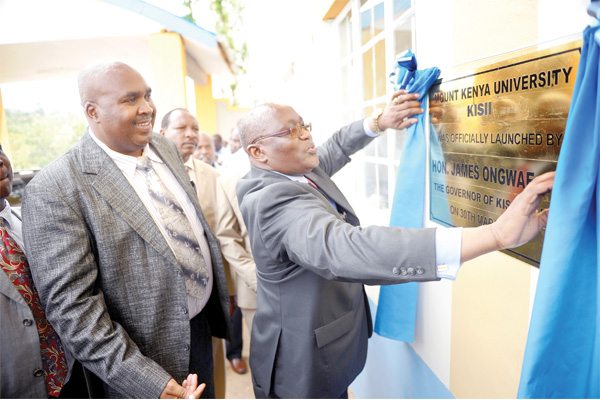One of the fastest rising investor in the education sector plans to have an indigenous university he founded at the Nairobi Stock Exchange (NSE). The founder of Mount Kenya University (MKU), the first private university in Kenya to have a turnover of over US$ 55 million (Sh5.6 billion) says the listing will enable the institution to expand its ownership as well as raise more capital for expansion and research.
“However, the university and its assets will remain under the ownership of the holding company,” said Dr Simon Gicharu who chose to invest in the education sector to assist local students studying in foreign countries and at the same time tame capital flight.
The founder and chairman of the university, with 16 campuses and centres in Eastern Africa region, tells of why he came up with the idea to set up the university and his motivation as an entrepreneur: “I was at Cranfield University, United Kingdom in 1995 for my postgraduate studies. I noticed that fellow African students from disadvantaged backgrounds endured a lot of suffering trying to survive in the UK.”
The suffering of the students motivated him to find a solution upon his return, a solution that would be homegrown that would eliminate the need for students to travel overseas. At that time, opportunities for higher education in Kenya were very limited.
Public universities in Kenya, which admitted students through the government-run Joint Admissions Board, absorbed only four percent of qualified students into the public university system. The few private universities were very expensive. In a region where the average Gross Domestic Product is $744.28 (Sh75,839), they charged up to USD6,000 per course.
Gicharu remembers how he secured a $200 (Sh20,386) loan from Equity Building Society (now Equity Bank), and established the Kenya Entrepreneurship Promotion Programme, which, working in partnership with a local church in rural Kenya, offered basic computer training to young people. He partnered with the Kenya Institute of Management to establish Thika Institute of Technology, a formal college operating from a commercial building in Thika town.
This move paved the way for Thika Institute of Technology to become the first private institution in Kenya to be accredited by the Pharmacy and Poisons Board, to offer Diploma courses in Pharmacy. The student numbers grew, and the college was on the pathway to profitability and eventually set up MKU in 2008.
Three years later, the university received a charter making Dr Gicharu, at 48, the only individual in East and Central Africa to have started a chartered university that has no ownership affiliation with the State, religious organisation or professional body.
By focusing on this segment of the student population that could neither be admitted to public universities, nor afford the relatively high fees at private universities, Mount Kenya University has become the largest private university in East and Central Africa. It has a student population of 50,000 spread across six countries, and a workforce of 4,000 who include teaching and non-teaching staff.
MKU has 93 accredited academic programmes offered at its 11 schools, and through various modes of learning namely online, regular, school-based and part-time. With 60 accredited science programmes, the university takes the lion’s share in training professionals in health and applied sciences among private universities in Kenya.
A believer in investing in modern research and innovation, Dr Gicharu boasts a series of innovation approaches that have been mainstreamed as the key driver in steering the university, and which, he says , are intended to benefit the less fortunate and cash-trapped students in the diaspora.
The unique Pay As You Learn innovation approach allows students at the university to pay only a fraction of the tuition fees once they register. “We realised majority who qualified to join university could not do so because of lack of fees, and that government and the few private universities required students to pay the full amount of fees upfront,” he says.








